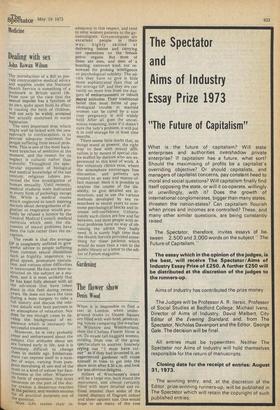Medicine
Dealing with sex
John Rowan Wilson
The introduction of a Bill to provide contraceptive medical advice and supplies under the National Health Service is something of a landmark in British social life. From now on the view that the sexual impulse has a function of its own, quite apart from its effect In causing the birth of children, Will not only be widely accepted but actually enshrined in social legislation.
The next important step, which Might well be linked with the new approach to contraception, is to Provide adequate treatment for People suffering from sexual problems. This is one of the most backward branches of medicine at the moment, and the reason for its neglect is cultural rather than scientific. Throughout the spectacular expansion of biological and medical knowledge of the last century, religious taboos prevented the free investigation of human sexuality. Until recently, Medical students were instructed in every form of pathology except this. While a medical course Which neglected to teach aspiring doctors about derangeinents of digestion or respiration would probably be refused a licence by the General Medical Council, medical curricula which omit the discussion of sexual problems have been the rule rather than the exception.
The resurlt is that the average GP is completely unfitted to give usetul advice to people suffering from common sexual disabilities such as frigidity, impotence, vaginal spasm, premature ejacula!Ion, and various other difficulties in intercourse. He has not been instructed on the subject as a student, and it is most unlikely that he has kept fully abreast with all the advances that have taken Place in this field during recent Years. He does not have the time during a busy surgery to take a full history and discuss the relevant details with both partners in an atmosphere of relaxation. Nor does he see enough cases to develop the background of exPerience which is necessary for successful treatment.
Moreover, he is very probably tense and embarrassed about the subject. Our attitudes about sex are formed early in life, and it is extremely difficult to change them in middle age. Embarrassment can express itself in a number of ways, varying from pomPous moralising at one end of the scale to a kind of saloon bar facetiousness at the other. Whatever as form of expression, this inner tenseness on the part of the doctor creates a disastrous reaction fl the patient, and renders success or all practical purposes out of the question.
Most GPs realise their in
adequacy in this respect, and tend to refer women patients to the gynaecologists. Gynaecologists are excellent people in their way, highly skilled at delivering babies and carrying out operations on the female pelvic organs. But most of them •are men, and men of a bustling, extrovert kind, not renowned for probing intelligence or psychological subtlety. The advice they have to give is little more sophisticated than that of the average GP, and they are certainly no more free from the dangers of embarrassment or inbuilt moral attitudes. Their traditional belief that most forms of psychological trouble in married women can be cured by• a nice cosy pregnancy is still widely held. After all, goes the unconscious reasoning, even if it doesn't cure the lady's problem, it will put it in cold storage for at least nine months....
There seems little doubt that, as things stand at present, the right way to deal with sexual difficulties is by means of special clinics staffed by doctors who are experienced in this kind of work. A few voluntary clinics exist, where the atmosphere encourages free discussion, and patients are treated in an easy and matter-offact manner. Here it is possible to analyse the course of the disability, to give detailed sex instruction, and to use the various methods developed by sex researchers in recent year's to overcome psychological blocks and increase self-confidence. Unfortunately such clinics are few and far between, and most people with sexual problems have no way of obtaining the advice they badly need. It is surely high time that the Health Service provided something for these patients. which would do more than a visit to the public library or a letter to the editor of Forum magazine.


































 Previous page
Previous page